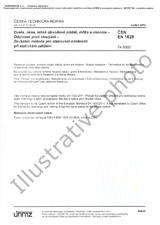We need your consent to use the individual data so that you can see information about your interests, among other things. Click "OK" to give your consent.
ČSN EN ISO 22007-6 (640142)
Plastics - Determination of thermal conductivity and thermal diffusivity - Part 6: Comparative method for low thermal conductivities using a temperature-modulation technique
Automatically translated name:
Plastics - Determination of thermal conductivity and heat dissipation - Part 6: Comparison method for low thermal conductivity using a thermally modulated field (ISO direct corrections).
STANDARD published on 1.9.2015
The information about the standard:
Designation standards: ČSN EN ISO 22007-6
Classification mark: 640142
Catalog number: 97776
Publication date standards: 1.9.2015
SKU: NS-614196
The number of pages: 28
Approximate weight : 84 g (0.19 lbs)
Country: Czech technical standard
Category: Technical standards ČSN
The category - similar standards:
Annotation of standard text ČSN EN ISO 22007-6 (640142):
This part of ISO 22007 specifies a modulated temperature method realizing the measurement of thermal conductivity. An input of temperature deviation is less than 1 K, and a double lock-in method is applied to amplify the small temperature modulation.
ISO 22007 3 specifies one of the modulated temperature methods where the phase shift is measured in the thermally thick condition, kd >> 1 [k = (w/2a)1/2, w: angular frequency of temperature wave, a: thermal diffusivity, and d: thickness of the specimen]. In this condition, the backing material does not affect on the phase shift results on the sensor, on which temperature wave decays exponentially.
On the other hand, if kd << 1, the decay of temperature modulation is influenced by the backing materials. Based on this principle, this part of ISO 22007 specifies the method to determine the thermal conductivity of the sample (as a backing material), comparing the decay of temperature wave detected on both surfaces of the probe material.
Thermal conductivity is determined from the correlation between the thermal impedance and the decay ratio of amplitude using two reference materials measured at the same frequency and temperature.
The covering thermal conductivity range is adjusted with the reference materials and the probe materials. Basically, thermal conductivity is determined in the range from 0,026 W/mK to 0,6 W/mK.
In the case applying the method to inhomogeneous materials, cares must be taken to choose the appropriate measurement conditions in accordance with the thermal penetration depth
Preview of the standard ČSN EN ISO 22007-6 (640142)
We recommend:
Technical standards updating
Do you want to make sure you use only the valid technical standards?
We can offer you a solution which will provide you a monthly overview concerning the updating of standards which you use.
Would you like to know more? Look at this page.




 Cookies
Cookies
